Bureau Veritas Classes its First Methanol Fual-Fuel Container Ship

Bureau Veritas Marine & Offshore (BV) has classed its first methanol-fueled containership, CMA CGM ANTIGONE. The 15,000 TEU methanol dual-fuel vessel was built by CSSC Jiangnan Shipyard for the CMA CGM Group, and officially named on December 11 and delivered on December 12.CMA CGM ANTIGONE is the lead ship of CSSC Jiangnan Shipyard’s independently designed “Kun” series of 15,000 TEU-class methanol dual-fuel container ships. With an overall length of 366 meters, the vessel represents…
Shipping Majors to Study Methanol Fuel Supply Chain on US Gulf Coast

American Bureau of Shipping (ABS), Japan’s ENEOS, Nippon Yusen Kabushiki Kaisha (NYK Line) and SEACOR Holdings have launched a joint study to develop a commercial methanol marine fuel supply network along the U.S. Gulf Coast.The study aims to establish the first large-scale ship-to-ship methanol bunkering operations in the United States, as the global shipping industry looks for practical pathways to meet the International Maritime Organization’s target of net-zero greenhouse gas emissions by 2050.Methanol…
Low-Emission Cement Carrying Vessel to be Dual-Fuel Methanol

Heidelberg Materials Northern Europe has taken a decisive step toward low-emission coastal logistics with the development of a next-generation methanol-powered cement carrier, an 80% emissions-cutting vessel that could redefine short-sea bulk operations in Scandinavia. Planned to enter service in early 2028, the newbuild is the product of a multi-stakeholder public-private partnership involving the Hartmann Group, the Green Shipping Programme (GSP) and the Norwegian NOx Fund,…
Advanced Polymer Coatings Signs Deal to Coat Two Methanol Tankers with Fratelli Cosulich
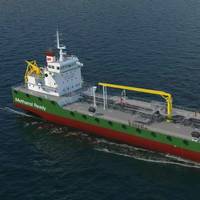
Manufacturer Advanced Polymer Coatings (APC) has signed a deal with global maritime transportation group Fratelli Cosulich to support its methanol-ready fleet expansion.APC has signed a contract with the Italian headquartered group to supply its industry-leading MarineLINE cargo tank coating to two new IMO Class II chemical tankers, to prepare them for methanol bunkering in Singapore.The MarineLINE cargo tank coating will ensure superior chemical resistance, faster tank turnaround and extended service life.The 7…
DNV: Methanol Emerging as Scalable Marine Fuel but Economics Still Limit Uptake
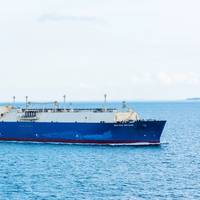
Methanol is emerging as a practical alternative fuel for deep-sea shipping as engines and technical systems reach high readiness levels, but high costs and limited supply continue to constrain wider adoption, classification society DNV said in a new report.As the industry explores multiple decarbonization pathways, methanol is gaining attention as a practical and scalable alternative fuel for deep-sea shipping, supported by over 450 methanol-capable vessels in operation and on order and technical solutions now available for all major ship types.DNV’s latest white paper…
Singapore to Bunker Methanol Next Year
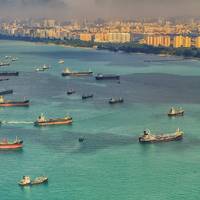
The Maritime and Port Authority of Singapore (MPA) will issue licenses to supply methanol as marine fuel in the Port of Singapore from January 1, 2026, following the Call for Applications launched in March 2025.Licenses will be awarded to Global Energy Trading, Golden Island, and PetroChina International (Singapore).The three companies were selected from 13 applicants through a comprehensive evaluation process that assessed supply chain reliability, operational readiness, safety systems, and the sustainability certification of the methanol to be supplied.
Stena Futura: Methanol-Ready Freight Ferry Delivered
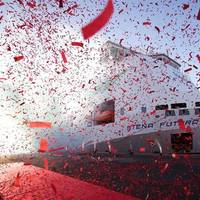
More than 200 guests attended the official naming ceremony of Stena Line’s newest vessel, Stena Futura, at Belfast Harbour. The 147-mhybrid freight ferry Stena Futura is the first of two next-generation “NewMax” freight vessels purpose-built for the busy Belfast–Heysham route. The ship is methanol-ready and equipped with hybrid propulsion systems, including battery capability and shore power connectivity. These innovations will help Stena Line achieve its goal of reducing CO₂ emissions by 30% by 2030.The naming ceremony was carried out by the ship’s Godmother…
Powering On with Methanol, or Not

This week, Rolls-Royce announced that it has successfully tested the world’s first high-speed marine engine powered exclusively by methanol on its test bench in Friedrichshafen.Together with its partners in the meOHmare research project, Rolls-Royce says its engineers have therefore reached an important milestone on the road to climate-neutral and environmentally friendly propulsion solutions for shipping.Also this week, Everllence announced the world’s first conversion of its…
Everllence and Partners Complete S90 Methanol Engine Retrofit
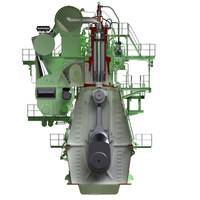
Everllence has announced the world’s first conversion of an Everllence B&W S90 two-stroke engine to dual-fuel methanol running following the successful sea-trials of COSCO Shipping Lines’ 20,000+ TEU container vessel, COSCO Shipping Libra.The vessel’s 11S90ME-C engine was retrofitted to an 11S90ME-LGIM (-Liquid Gas Injection Methanol) unit.Everllence PrimeServ – Everllence’s after-sales division – partnered with COSCO Shipping Heavy Industry from concept to execution in delivering the world’s first S90 methanol engine retrofit…
Rolls-Royce Tests Pure Methanol Engine
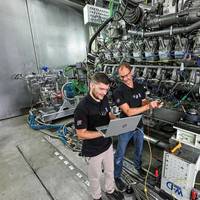
Rolls-Royce has successfully tested the world’s first high-speed marine engine powered exclusively by methanol on its test bench in Friedrichshafen.Together with their partners in the meOHmare research project, Rolls-Royce says its engineers have thus reached an important milestone on the road to climate-neutral and environmentally friendly propulsion solutions for shipping.The joint project meOHmare is funded by the German Federal Ministry for Economic Affairs and Energy and combines the expertise of Rolls-Royce…
ClassNK Grants Approval for SRC Group’s Methanol Superstorage Tank

ClassNK has issued an approval in principle (AiP) for a methanol fuel tank design concept developed by SRC Group, which uses a Sandwich Plate System (SPS) technology to almost double shipboard storage capacity for both methanol and ethanol.The certification demonstrates its feasibility from regulatory and safety perspectives.With the growing adoption of alternative fuels such as methanol in the maritime industry, the development of safe and efficient fuel storage solutions has become increasingly important.In contrast to traditional fuel tanks…
Ulsan Port Completes Its First Green Methanol STS Bunkering for Bulk Carrier
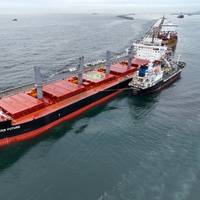
Ulsan Port Authority (UPA) has completed Korea’s first methanol bunkering for a dual-fuel bulk carrier at Ulsan Port.The STS for a bulk carrier, conducted on September 28, 2025, follows Ulsan Port’s world-first successful methanol bunkering demonstrations for container ships (PTS/STS) in 2023-2024.With the latest achievement, Ulsan Port has expanded its bunkering track record from container ships to bulk carriers.The operation was conducted for Green Future, a methanol dual-fuel bulk carrier chartered by NYK Bulk & Projects Carriers…
Chinese Companies Order Methanol-Fueled VLOCs

Qingdao Beihai shipyard has ordered 10 × Everllence B&W 7G80ME-LGIM (Liquid Gas Injection Methanol) Mk 10.5 engines in connection with the construction of 10 × 325,000 dwt very large ore carriers (VLOC) for Chinese shipping companies, Shandong Shipping and Bohai Ocean Shipping.Each engine will come accompanied by an Everllence proprietary EGRTC (Exhaust Gas Recirculation – Turbocharger Cut-out) system for Tier III NOx compliance.Upon completion, the vessels will immediately go out on charter to Vale S.A.…
CMES Takes Delivery of 9,300-Car Methanol Dual-Fuel PCTC
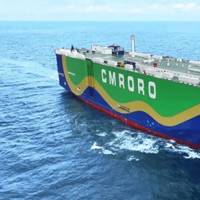
China Merchants Energy Shipping (CMES) has officially taken delivery of the world's first 9,300-car capacity methanol dual-fuel powered pure car and truck carrier (PCTC), CM Hong Kong.The 220-meter vessel was built by China Merchants Industry and will sail under the flag of Hong Kong. It has 13 cargo decks and is capable of transporting a wide range of cargo, including cars, trucks, buses, heavy machinery, and new energy vehicles fueled by hydrogen and natural gas.CM Hong Kong features a dual-fuel methanol main engine…
Sanmar Launches World’s First Dual-Fuel Methanol Escort Tug
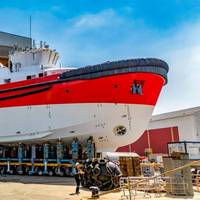
Sanmar Shipyards has launched the first of two of the world’s first large purpose-built dual fuel methanol escort tugs it is building for KOTUG Canada. KOTUG Canada is a partnership between KOTUG International B.V. and Canada's Horizon Maritime Inc.Based on the RAsalvor 4400-DFM design from Canadian naval architects Robert Allan Ltd, the two tugs—the first Sanmar has built for KOTUG Canada—will service Canada’s Trans Mountain Expansion Project (TMEP), escorting tankers from the…
Ethanol as an Alternative to Methanol

This week MarineLink reported that the Global Ethanol Association (GEA) has officially launched as an independent, non-profit international organization headquartered in Switzerland.GEA’s first flagship program is the Marine Fuel Sector Initiative, an industry led effort to transform ethanol’s market potential into commercial reality and establish it as a cornerstone of the sustainable marine fuel mix.Sylvain Zurcher, Co-Founder & President of the GEA, notes that the US is one of the world’s largest ethanol producers with strong infrastructure already in place.
Everllence and MEYER RE Cooperate on Methanol Retrofits
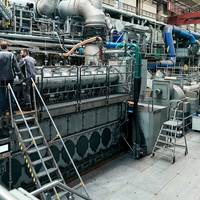
MEYER RE has established a strategic partnership with Everllence to advance methanol retrofit solutions in the maritime industry.The collaboration focuses on the retrofitting of existing Everllence four-stroke engines and vessels, providing a practical solution for shipping companies transitioning towards greener fuel alternatives.Germany-based MEYER RE provides after sales support for cruise ships throughout their entire service life, modernization measures as well as the implementation of sustainable solutions and maintenance.Henning Jongebloed…
First Order for Everllence 175D Dual-Fuel Methanol Engine
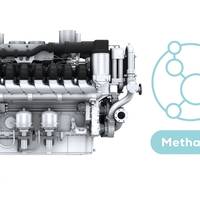
Everllence has announced the first order for its 175DF-M (dual-fuel methanol) engine for a superyacht currently under construction by an undisclosed European shipyard.Everllence’s scope of supply covers 2 × 12V175DF-M and 1 × 16V175DF-M variable-speed yacht gensets, including methanol fuel-supply systems. Delivery is scheduled for July 2027.The company reports that many customers from the ferry, cruise, offshore, tug, superyacht and governmental segments have shown a strong interest…
Rem Offshore's Zero-Emission Subsea Construction Vessel Hits Water (Video)
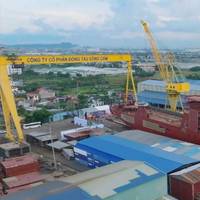
Norwegian shipowner Rem Offshore has launched the hull for its dual-fuel methanol energy subsea construction vessel (ESCV) Rem Pioneer in Vietnam, months ahead of schedule.The launch ceremony was held on June 27 at Song Cam shipyard in Vietnam.According to the company, hull construction will continue for a while, and outfitting will begin in the autumn at Myklebust Verft.Rem Pioneer ESCV will be delivered in 2026 and will be the first of its kind that can perform heavy construction…
ClassNK Grants Approval for LCO2-Methanol Carrier from Mitsubishi and MOL
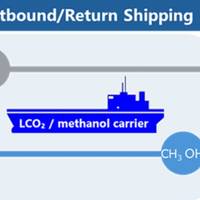
ClassNK has issued world's first Approval in Principle (AiP) for LCO2-methanol carrier, jointly developed by Mitsubishi Shipbuilding and Mitsui O.S.K. Lines (MOL).The certification confirms the feasibility of the vessel, which is being developed for commercialization, from regulatory and safety perspectives. It marks the world’s first issuance of an AiP for a LCO2-methanol carrier.The vessel for which Mitsubishi Shipbuilding and MOL acquired AiP is based on a low-pressure LCO2 carrier.It aims to transport CO2…
AiP Granted for World's First LCO₂ and Methanol Carrier
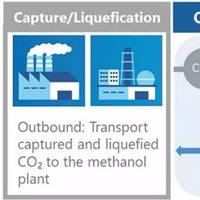
Mitsubishi Shipbuilding and Mitsui O.S.K. Lines have acquired Approval in Principle (AiP) from CLassNK for the design of their jointly developed liquefied CO2 (LCO2) and methanol carrier, a world first for this type of vessel.The vessel is based on a low-pressure LCO2 carrier. It aims to transport CO2, which serves as raw material, on outward voyages and synthetic methanol on return voyages.If dual transport of CO2 and methanol is achieved, empty-cargo trips can be eliminated…
Maersk Ready for Ops with New Methanol-Fueled 17,480 TEU Container Ship
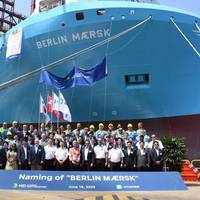
Danish shipping group A.P. Moller - Maersk has named the first vessel in a series of 17,480 TEU vessels equipped with dual-fuel methanol propulsion, which will operate under the name of Berlin Mærsk.The naming event took place on June 18, at Hyundai Heavy Industries’ (HHI) yard in Ulsan, South Korea.Berlin Mærsk is the 14th dual-fuel newbuild entering the Maersk fleet, and it will be followed by additional five sister vessels in this new class of container ships.All six vessels in the series are being built by HHI with delivery in 2025.
Shipbuilding: ONE Singapore Joins the Fleet
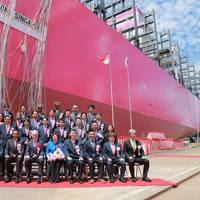
Ocean Network Express (ONE) named the 13,900-TEU ONE Singapore, the sixth vessel in a series of 20 ammonia/methanol ready container vessels. The naming ceremony took place at the Hiroshima Shipyard of Imabari Shipbuilding Co. Ltd. in Japan, marking another milestone in ONE's fleet expansion program."Today's naming of ONE Singapore signifies further progress in our fleet expansion strategy," said Jeremy Nixon, CEO, ONE. "This vessel, carrying the name of our global headquarters city, symbolizes our strong connection to Singapore's vibrant maritime ecosystem.










